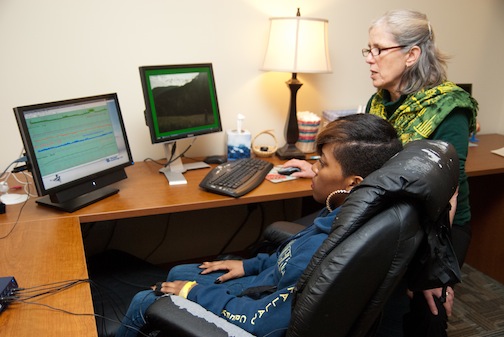Seeking good feedback: UNCA instructor Connie Schrader (right) leads student Michele Pierce (left) through a series of tests at the school’s Biofeedback and Stress Lab, which is used to help treat a variety of conditions such as sleep problems, Attention Deficit Disorder and depression. Photo by Max Cooper.
When UNCA senior Michele Pierce had a stress assessment as part of her Introduction to Biofeedback class recently, she was surprised by how sensitive the sensors were, as they registered subtle tension in her shoulders that she hadn’t been aware of.
“It’s just weird to see it on the graph,” the health-and-wellness major explains, adding, “It was actually kind of cool.”
One of only two biofeedback labs in the entire UNC system, the facility also gives local students an extraordinary ability to conduct research. Since the lab was established 10 years ago, says Director Connie Schrader, more than 1,000 students and faculty members have enjoyed free access to high-end technology that, besides treating various conditions, has been used to track physiological responses during everything from playing video games to athletic activity to attentional states and more.
Most of those seeking treatment want help dealing with stress; others have sleep problems, attention deficit disorder or depression, and they’ve usually already tried more traditional modalities such as talk therapy and medication, notes Schrader. “They might think, ‘I’ve heard about this weird biofeedback thing. I’m not sure what it is, but nothing else has worked.’”
A system of sensors measures pulse, brain waves, skin conductance and other physiological functions, and various gamelike software programs guide users as they elicit different psychological states. The idea is to cultivate a sense of internal mind-body focus and awareness that, in time, will carry over to real-life situations.
“We try to encourage people to become more mindful of the relationship between the way their body’s working and their emotional, cognitive states,” says Schrader. “And when we’re successful at that, then they have that tool, and they can employ it as they need to.”
Although she hasn’t quantified the results of the sessions over the years, Schrader says user feedback has been universally positive. “I see people on campus and they’ll say, ‘That really made a difference,’ she reports. “I haven’t heard anyone complain or say, ‘That was a waste of time.’”
Unlike some other forms of Western medicine, Schrader maintains, biofeedback is empowering. The premise, she says, is, “Any behavior you have is one you learned, so you can unlearn it if you want to.”
“My fundamental philosophy is, health is choice. … When you feel like that’s something you can control, you’ll be able to move yourself toward a state that you find more helpful.”
And if the technology is modern, there’s nothing new about the goals, Schrader points out. “I always stress to people that we’re using a computer interface, but all that we’re trying to do is something we’ve done for millennia — we just called it ‘mindfulness practice.’”
Confronting habits
Still, biofeedback is not necessarily an easy fix: Depending on the person and their problem, it can take a lot of sessions and dedication to make headway.
“You’re confronting habit, and sometimes you’re dealing with a pleasure circuit. So it depends on how much you want to change. If the change is valuable to you, you’ll pursue it,” she explains.
Several Asheville practitioners also offer biofeedback therapy. One of them is Schrader’s mentor, Dr. Ed Hamlin, a renowned expert in the field who founded the Center for the Advancement of Human Potential. But the treatment is costly, notes
Schrader: $300 to $400 for an initial intake and $35 to $70 for subsequent sessions.
Still, she feels biofeedback techniques will increase in popularity as interest in alternative medicine continues to grow.
“Chemicals,” says Schrader, “manage symptoms. And maybe money is better spent getting to the cause. … One of the big values in doing this treatment is realizing your self-efficacy.”



Before you comment
The comments section is here to provide a platform for civil dialogue on the issues we face together as a local community. Xpress is committed to offering this platform for all voices, but when the tone of the discussion gets nasty or strays off topic, we believe many people choose not to participate. Xpress editors are determined to moderate comments to ensure a constructive interchange is maintained. All comments judged not to be in keeping with the spirit of civil discourse will be removed and repeat violators will be banned. See here for our terms of service. Thank you for being part of this effort to promote respectful discussion.